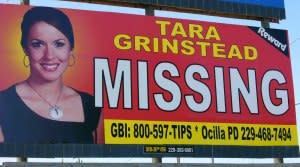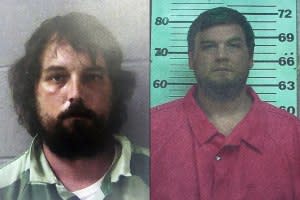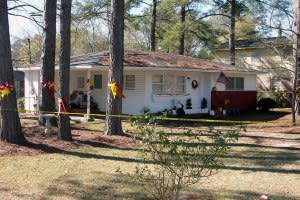How the Up and Vanished podcast helped crack a 2005 cold case
Ever since Sarah Koening ended her last recorded phone call with Adnan Syed two years ago, a flurry of podcasts have attempted to replicate the appeal and success of Serial. Few have matched its meteoric rise, and even fewer have accomplished what Koening was never able to do: solve a murder mystery.
That is until Payne Lindsey came along.
Lindsey hosts Up and Vanished, an investigative podcast about the missing case of Tara Grinstead, a 30-year-old beauty queen and high school teacher who disappeared from her Ocilla, Georgia, home in October 2005. Each week, listeners follow Lindsey as he scours through documents, retraces police steps, and earns the trust of locals in the small town of 3,414 people. As a result, the podcast has gained a strong following, garnering 33 million downloads to date and reaching as high as No. 2 on the iTunes charts. And just six months after the show launched, all of Lindsey’s hard work paid off.
In February, the Georgia Bureau of Investigation (GBI) announced an arrest in the case and credited the media for playing a “significant role” in the investigation. One week later, a second arrest was made.

On Wednesday, a grand jury indicted Ryan Duke, on murder charges. Duke, now 33, attended the high school where Grinstead worked but graduated three years prior to her disappearance and was arrested in February after police received an anonymous tip. He was indicted on six charges, including burglary, aggravated assault, malice murder, felony murder, and concealing a death. Duke’s former classmate, Bo Dukes, now 32, was also arrested and charged with concealing a death, hindering apprehension or punishment of a criminal, and tampering with evidence. Dukes is currently out on bail.
Prior to the release of Up and Vanished last fall, Lindsey’s résumé listed only a handful of short films and music videos. In search of a more difficult next project, the documentarian sought to tackle the true-crime genre, crediting the success of Making a Murderer and The Jinx as inspirations. To start, Payne searched through the GBI’s cold case files online. It was there that he found Grinstead’s case and was immediately hooked. His first stroke of luck arrived when Dr. Maurice Godwin, the private investigator hired by Grinstead’s family who had been working on the case for over 10 years, reached out after Lindsey inquired about the case in a WebSleuths.com forum. With Lindsey acting as Godwin’s fresh set of eyes on the investigation, the two sought out to solve one of the largest case files in Georgia history.
With Wednesday’s indictment marking the end of the 11-year cold case, Lindsey is about to wrap up his work on Up and Vanished. Until then, the Atlanta-based filmmaker talks to EW about the podcast’s success, the future of Up and Vanished, and why he almost never did the show to begin with.

ENTERTAINMENT WEEKLY: How does it feel knowing your work contributed to the break in the case?
LINDSEY: It feels amazing, really. It kind of gives me hope, it’s kind of inspiring to even myself that people can still make a difference. It’s not impossible to solve an unsolved case or make a difference as a journalist. Hopefully, it can inspire the right people to do something similar in the future and have a positive impact like this [podcast] has.
Besides physical proximity, what attracted you to this case?
Just the sheer mystery behind this case is what intrigued me initially. The circumstances under which she disappeared were baffling to me and the fact that nobody had seemed to be any closer to the answers 10, 11 years later just blew my mind. I felt like there was a lot of room for answers. I assumed that the police and the GBI did their job but having a fresh look at it, just learning about this case for the first time, I was like, “There’s no way they don’t know the answers to some of this stuff. I can find the answer to that!” It almost gets you pumped up, like, well let me take a stab at it.
As a documentarian, you obviously know how to tell a good story. But true crime was foreign territory. How did you know where to even start?
It was different. I approached it from a storytelling standpoint. I never really viewed myself as a journalist, per se, but technically I am. My passion was always in telling other people’s stories in a way that they’ve never been told. I wanted to paint this whole narrative of this bizarre unsolved mystery.
I almost didn’t do the podcast because I didn’t think I could do it. Not that I didn’t have confidence in myself, I just didn’t view myself as a podcaster. It felt like I was trying to be somebody I wasn’t. You have these professionals and that’s their thing. What I do is not that so why am I trying to be that? One day, I pulled the trigger and said you know what, I’m just going to do it.

You haven’t been able to access any of the official criminal investigation files because the state still considered this case an open investigation (before the arrests were made). How were you able to work around the Georgia Open Records Act?
It was really helpful to have the investigator who worked this case personally. I could ask him off-the-cuff questions and not sound like I was stupid. I really didn’t know anything. I did not have any sort of advantage when it came to figuring some of this stuff out. I didn’t know any more than anybody else did. But I wanted to learn how. And so really this whole time, as far as the professional side of things, that was always a learning curve. But what I tried to use to my advantage was my people skills. What I knew how to do was try to get people to talk to me like a person. That ended up being a really refreshing approach to people because I wasn’t coming at it like, “This document says this.” What I made sure I did do was use my moral compass the whole time with what I deemed appropriate and respectful and responsible.
Now, I was aggressive about it a lot of times because at a certain point if I’m going to put this much time and effort into this I want to solve it. Did I think I could do it? No. Statistically, that doesn’t happen. I thought if I was persistent enough, went in there and put the blinders on, and wasn’t scared to do something, then maybe I could make a difference. That was my motto throughout the whole thing.
You’ve talked to a number of people for this podcast. Did you ever speak with Tara’s family?
I was always very sensitive about that and I didn’t want to come in early on. I didn’t want to come in and say, “Hey I’m some new podcaster guy and I’m making a story on your daughter’s disappearance.” I didn’t want to come across like an opportunist or something. At first, I almost felt like I needed to gain their respect and put together a respectable product that people connected to and could see what’s different and refreshing and find new information and gain the trust and respect from people in the community.
Early on I talked to the police chief in Ocilla and he’s still really close to Tara’s family. He said he’d talk to Tara’s family about the podcast and was kind of like a line of communication for us. That’s kind of how they found out about me. They supported the podcast 100 percent but they said they didn’t want to be a part of it because it’s been too painful. ... I’ve never talked to them directly. Once the dust settles a little bit, I plan on connecting with them. I would love to have them on the podcast only if it’s something they’d want to do.

In the first episode, you said you found the case when you were digging around for an idea for a documentary. Are you still going to do one?
Eventually, I’ll do a season 2 of Up and Vanished on a cold case of another missing person. But before that, I still plan on doing a visual TV or film version of this story, which would be sort of a recap of the podcast and a lot of stuff that I didn’t put out on the podcast. Kind of ending the story the right way, and all the conclusions, and the healing of the town, and all the other truths that I feel still needs to come out. So there’s still a lot left to tell in the story. It’s sort of like the refs hit the reset button [when the arrests were made] but I quickly found out that there’s a lot more to this story and it may not ever come out unless someone like me chooses to try to tell it. We’re working on that behind the scenes now and can announce it in the near future. We’re pitching it as a television docuseries right now, where it’s in episode form and it’s just basically a longform documentary of Tara’s disappearance.
At what point do you stop and move on to another case?
That’s a tough question. Before we took a break at episode 12, I said that we were going to do 18 episodes and it was during that break that the arrests happened. So we’ll probably go after episode 18 for a little bit. The easy way to put it right now is we’re going to continue to tell the story until we feel like we’ve told it. We’re not going to drag it out unnecessarily but at the same time we don’t want to end it abruptly without telling what we think is the whole story.

What’s left to tell?
Really the biggest points are: What really happened here? Who is Ryan Duke, who is Bo Dukes? What were their roles? Are the charges that are laid against them the right charges? Are the roles switched? Are they more involved, less involved? Did somebody know about this beforehand? Was there a way to have solved this 10 or 12 years ago? And if there was, let’s not cover that up. Let’s let that out there, let’s let the truth out.
Also, it’s the story of the healing process. How does [Tara’s ex-boyfriend] Marcus Harper feel? How does anybody who’s been labeled a person of interest in this case feel? What’s their real story? How do they explain some of the things that made them look guilty or cause suspicion over the years? What are their stories?
It’s this whole other chapter to this, the aftermath. We have some truth but we don’t have the whole truth. We can’t count on the police or anybody else to just tell us that. They haven’t told us anything for 12 years and now there’s a gag order so clearly it’s not something that they’re trying to do at this point in time. I think they want to but without me or you and anybody else we run the risk of never knowing the whole story and never being able to completely heal and move on.
